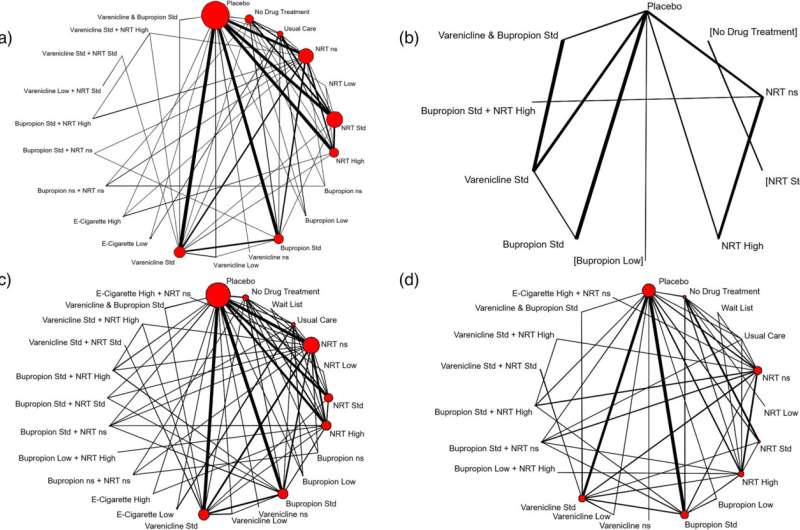Study: Combined treatments are the most effective to stop smoking

Combination therapies, particularly varenicline and nicotine replacement therapy (NRT) combined, are the most effective tobacco cessation pharmacotherapies, the largest review to examine the effectiveness and safety of electronic cigarettes (e-cigarettes) and medicines that people use to quit tobacco has found.
The study, led by the University of Bristol, and published today [12 October] in Addiction, was funded by the National Institute for Health Research (NIHR), the research partner of the NHS, public health and social care.
Varenicline, bupropion, and NRT are recommended as first line treatments to stop smoking by the National Institute for Health and Care Excellence (NICE). E-cigarettes can be used as aids to quit smoking, but currently there are no medically licensed e-cigarettes in the UK. As cigarette smoking is globally a leading cause of premature death and illness and is costly, the aim of the research was to find out the clinical effectiveness and safety of varenicline, bupropion, NRT and e-cigarettes when compared with each other.
Previous reviews of smoking cessation medicines have rarely investigated combinations of tobacco cessation pharmacotherapies, examining monotherapies or combination NRT. Concerns have also been raised around the safety of e-cigarettes following a US outbreak of severe lung injury in users of tetrahydrocannabinol (THC)-containing e-cigarettes, particularly those obtained from informal sources, such as friends and online dealers.
The researchers identified 363 trials for effectiveness and 355 for safety. Most single and combination therapies were more effective than placebo at helping people to stop smoking with varenicline monotherapy and varenicline plus NRT combined being the most effective. Bupropion was also shown to be effective, but was associated with increased risks of having a serious adverse event. E-cigarettes showed promise but more research is needed to establish their safety.
Dr. Kyla Thomas, Consultant Senior Lecturer in Public Health Medicine in the Bristol Medical School: Population Health Sciences (PHS) at the University of Bristol and lead author, said: "Although e-cigarettes showed promise as a means to stop smoking, more research is needed on their long-term effectiveness and safety, preferably in studies with active interventions as comparators.
"We also recommend further research to explore the effectiveness of combination pharmacological treatment together with counseling or psychological interventions."
Dr. Michael Dalili, Senior Research Associate in Public Health in the Bristol Medical School: PHS and co-author, added: "Our study strengthens the evidence base for the use of varenicline and NRT monotherapies as first line choices for tobacco cessation in line with current NICE recommendations. Our findings should provide reassurance to patients, clinicians, and policy makers about the safety of these treatments."
The findings could have implications on the licensing of smoking cessation treatments, as e-cigarettes and combination therapies are currently unlicensed, and could influence recommended treatments.
NICE will shortly be releasing their new guidance for "Tobacco: preventing uptake, promoting quitting and treating dependence," which will include this study's data.
More information: Kyla H. Thomas et al, Comparative clinical effectiveness and safety of tobacco cessation pharmacotherapies and electronic cigarettes: a systematic review and network meta-analysis of randomised controlled trials, Addiction (2021). DOI: 10.1111/add.15675



















